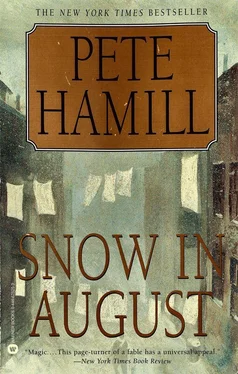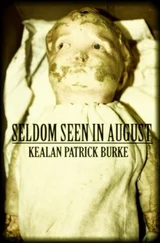“Is the church out there?” Michael said, feeling like a spy.
“Yes,” Rabbi Hirsch said. “But not a church. We say—” He leafed through the dictionary, ran his finger down a page. “Sanctuary.” He pronounced it sank-TOO-uh-rye . Michael said sanctuary for him. The rabbi repeated it several times.
“Can I see the mass, or whatever you call it? I mean, it’s not secret or anything, is it?”
“Yes, yes, is not the secret. You come sometime.”
So it was not a door to a treasure house, with gold ducats spilling from chests, and rubies and emeralds gleaming in the dim light. It was just a church. All he had to do now was convince Sonny. He turned to go and then saw the picture of the woman again.
“Is her name Judith?”
“No.” The rabbi paused. “Leah. Her name is Leah.” He stared at the framed photograph for a long time. “My wife.”
“She’s very beautiful.”
“Yes,” said Rabbi Hirsch. “But she’s dead.”
“I’m sorry, Rabbi,” the boy said.
“Is hard for a boy to understand, death.”
“My father’s dead too,” Michael said. “He was killed in the war.”
The rabbi turned away from his wife’s photograph.
“Excuse,” he said. “I am a fool. I think I am the only person with someone dead.”
“It’s okay, Rabbi,” Michael said.
“No. Death, is not okay for someone so young. At least I, I…” He couldn’t find the words. “I am very sorry.”
“Forget it,” the boy said. “I’m sorry about your wife, you’re sorry about my father. So next week we start English lessons.”
“Yiddish lessons,” the rabbi said.
“Both,” Michael said.
“Yes, both.”
January was full of storms.
In the first week, Michael saw a truck arrive outside Mister G’s candy store, its narrow hard-rubber wheels lurching over the scabbed ice, and fresh snow. Mister G’s sons carried out cartons, a table, suitcases, clocks, a bed, and a couch and then climbed into the truck with all that had belonged to them and drove away. They did not look back, nor did Frankie McCarthy come around to say goodbye.
A few days later, Unbeatable Joe assembled some of the regulars from his bar and produced ladders and planks and a winch and started the process or raising his sign to its former glory. The men worked. They drank whiskey. They heaved and groaned and cursed. They drank more whiskey. Michael, Sonny, and Jimmy watched from a warm vestibule across the street, snickering and making remarks. Unbeatable Joe and another man climbed to the planks and examined the steel rigging that was to hold the sign. Unbeatable Joe gestured down at the other men. Then the sign was raised on high, like a declaration of triumph.
But the wind began to blow hard, as it always did on Collins Street, and the men cursed and pulled on their ropes and backed up and rushed forward, and then the giant sign flew up in the air and came down with a tremendous crash, bringing the ladders, the planks, and Unbeatable Joe with it. The boys laughed and left the warmth of the doorway to watch Unbeatable Joe hopping on one foot and holding the other. The rest of the men were cursing and drinking whiskey from a bottle to stay warm.
And then Unbeatable Joe limped out of the bar with a huge fire axe and began to chop at the sign in a maniacal rage, his eyes wide, his hair rising in spikes, his nostrils flaring, and when he was exhausted, he handed the axe to one of the other men and that man chopped at the sign and passed it to another, who gave it to another, and back to Unbeatable Joe, and now there was a crowd, all cheering, guys from the factory across the street, women with shopping bags, kids from over on Pearse Street, urging the men on, raising fists. A police car came along and stopped and the cops got out, but the men just kept battering and smashing and splintering the sign until there was only a pile of broken pieces left, and the crowd roared, even the cops.
“Get me a broom,” Unbeatable Joe said. “We gotta sweep up this fuckin’ sign.”
When Michael told Rabbi Hirsch about this a few days later, his blue eyes danced and he laughed from his belly.
“The goyim are crazy,” he said.
Michael didn’t tell Rabbi Hirsch that some of the goyim were crazy in a different way. On the day of the destruction of Unbeatable Joe’s sign, Michael sat in the hallway beside the roof door with Sonny and Jimmy. It was too cold now to play in the streets. And Michael had begun to understand what Jack London meant when he described cabin fever.
“So what’s the story?” Sonny said.
“What do you mean?”
“The synagogue. What’d you find out?” Michael sighed.
“There’s nothing to find out,” he said. “The rabbi’s poorer than we are, Sonny. He’s got no telephone, he’s got no radio, he lives in one small room like a goddamned pauper.”
“That could be a, whatta you call it, a disguise.”
“Come on, Sonny. If there was a treasure, he could just take it over New York, sell it, and go somewhere that’s warm. Florida or someplace. What’s he need to be in the synagogue all day in his overcoat for?”
“To fool us,” Jimmy said.
“You mean fool me ,” Michael said. “He doesn’t even know you and Sonny are alive.”
“It’s the same difference,” Jimmy said. “All for one and one for all, right?”
“Right, but…”
Sonny leaned forward.
“Maybe he don’t know there’s a treasure there.”
Michael and Jimmy looked at him.
“Maybe… it was buried, or put in the fucking walls or something, and the last rabbi, he knew where it was, or had a map, or some secret code, and then that rabbi died before he could pass it on. Maybe that’s why he acts like it ain’t there.”
Michael stiffened. A week ago, he was thinking the same thing.
“But if that’s the case, what do we do?” he said. “Tear the building down?”
“Nah, nothing drastic.”
“Then what?”
“Keep your eyes open, that’s all. Wait.”
He said this as if Michael had agreed to a conspiracy, and Michael did not object. This silence made him feel treacherous. He had come to like the rabbi. He liked his accent. He liked what seemed to be his good heart. He liked the way he didn’t treat him like a kid and the way he was unafraid to make mistakes in his new language. But he didn’t say this to Sonny Montemarano. He didn’t want to be forced to choose between the rabbi he barely knew and someone he’d known since first grade. He said nothing, but he knew that Sonny would take his silence as an agreement. The way he had agreed, without words, to Frankie McCarthy’s reminder that he had seen nothing in Mister G’s candy store. So he said nothing. He would keep his eyes open anyway, as he got to know the rabbi, and in that way he could keep his word. But if he saw nothing, he would have nothing to report to Sonny.
Later, when he saw the rabbi to begin their lessons in Yiddish and English, Michael didn’t discuss Sonny and the rumors of hidden treasure. Instead he made the rabbi clap his hands in delight by counting to five in Yiddish. He told the rabbi about his schoolwork and the rabbi said study, study, study, and Michael thought about his mother explaining that the Jews always did their homework and maybe that’s why they were hated.
The rabbi listened carefully when Michael told him about his mother and how she had come to New York from Ireland after her mother died, long ago in 1930, and how she had met Tommy Devlin at a dance a few years later, which was about all that Michael knew about their story. His father, Tommy Devlin, was from Dublin, but he loved America so much he joined the army before he got drafted. He was an orphan too, the boy explained, just like his mother; and so Michael had never met any uncles or aunts or cousins.
Читать дальше












